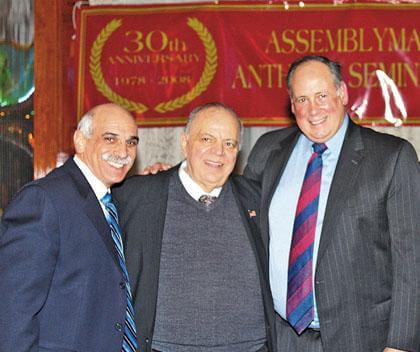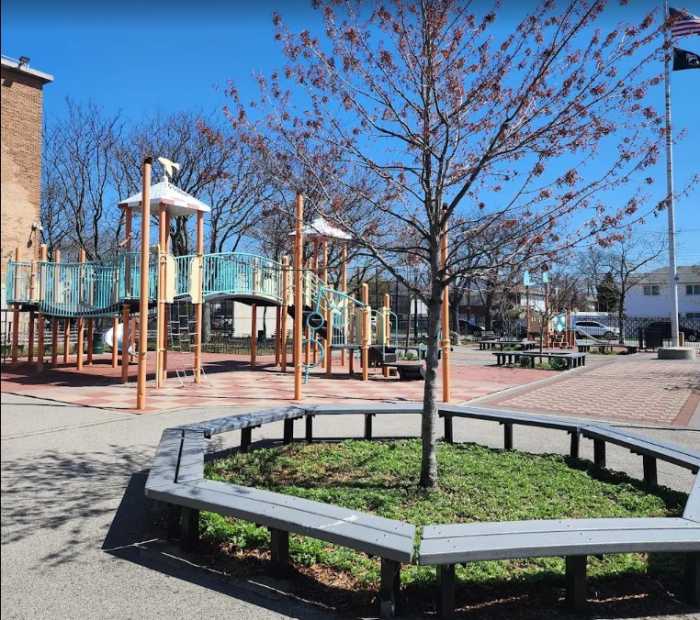By Howard Koplowitz
As former state Assemblyman Anthony Seminerio awaits sentencing in October after setting up a fake consulting company that took in nearly $1 million in corrupt payments, it remains unclear whether an investigation into Jamaica Hospital, which paid him $400,000, is underway.
A spokeswoman for the U.S. attorney’s office in Manhattan had no comment as to whether charges could be filed against two unidentified Jamaica Hospital administrators caught on federal wiretaps discussing state issues with Seminerio or whether an investigation has even started.
Pery Krinsky, one of Seminerio’s attorneys, declined to comment on Jamaica Hospital’s role in the case.
“It’s an ongoing matter,” Krinsky said. “Even though [Seminerio] pleaded guilty, it’s an ongoing matter.”
Seminerio entered a guilty plea last month in Manhattan federal court to honest services mail fraud charges for creating a fake consulting company, Marc Consultants, and using it to collect nearly $1 million in corrupt payments between April 2000 and September 2008, including $390,000 from Jamaica Hospital and its affiliated Medicaid-managed health care plan.
Jamaica Hospital declined to comment for this story.
The day before his guilty plea, Seminerio abruptly resigned from his Assembly seat via a brief letter to Speaker Sheldon Silver (D-Manhattan).
Michael Bachner, a Manhattan white collar criminal defense attorney, said there are two possibilities: Jamaica Hospital officials are being treated as victims of Seminerio or they are cooperating with the government.
“The theory is the payers are often victims,” said Bachner, who is using the Seminerio case in his arguments defending a client in a Con Edison bribery case. “They’re paying because implicit is the extortion.”
“It sounds like (Jamaica Hospital is) being treated more as victims here than as defendants or as conspirators,” Bachner said. “It sounds to me if there had been charges against the hospital, it would have happened already.”
Stephan Siegel, a Forest Hills defense attorney, former prosecutor and former Assembly counsel, said federal prosecutors would likely do a cost-benefit analysis in determining whether to bring charges against the hospital or the employees.
He said the government may decide that Seminerio’s guilty plea acted as a deterrent for the hospital to commit further wrongdoing.
“Is there any benefit to prosecute Jamaica Hospital for the Department of Justicei If not, they might end up with a consent decree,” Siegel said, referring to a hypothetical agreement to fine the hospital.
“For sure, what (Jamaica Hospital has) done is hired some legal talent and covered their gluteus maximus,” he said.
When Seminerio was indicted in September, it was unclear from court papers whether he or Jamaica Hospital initiated the payments or if the hospital reported the payments it gave him to authorities.
“If they were being bribed, the obligation of the hospital is to report it and not just pay it because they’re using public funds,” a source familiar with the case said.
What is clear is Seminerio and an unnamed Jamaica Hospital official discussed in a June 20, 2008, wiretapped conversation the hospital’s interest in acquiring two borough hospitals, according to the criminal complaint filed against Seminerio in September, which quoted an FBI agent. Hospital industry sources later identified Mary Immaculate Hospital in Jamaica and St. John’s Queens Hospital in Elmhurst as the two takeover targets.
At the time of the June wiretapped conversation, both hospitals were owned by St. Vincent’s Catholic Medical Centers, which had filed for Chapter 11 bankruptcy protection from creditors.
In another wiretapped conversation on July 10, 2008, between Seminerio and a state Health Department official, Seminerio urged the official to allow Jamaica Hospital to purchase the two borough hospitals, according to the complaint. The Health Department official said he would like “nothing better than to see” Jamaica Hospital get either Mary Immaculate and St. John’s, but that he was also speaking with an unnamed state senator about another hospital acquiring them. That unnamed hospital was the North Shore-Long Island Jewish Health System, according to health care industry sources.
Mary Immaculate and St. John’s wound up being acquired by Caritas Health Care, which went into Chapter 11 bankruptcy earlier this year, and closed both institutions.
According to the complaint, Seminerio and another unnamed Jamaica Hospital official discussed the state Assembly’s budget bill in a March 13, 2008, wiretapped conversation.
The official told Seminerio the budget was “not good for us” and that “we need a basic inflation factor,” urging Seminerio to “talk to your buddy,” referring to the chairman of an Assembly committee.
“I can get you anybody you want,” Seminerio said on the wiretap.
The former assemblyman also discussed wanting a payment from Jamaica Hospital with one of its officials.
On an April 22, 2008, wiretap, Seminerio called “for my check,” according to the complaint.
The official said he would “follow up,” “go rattle some cages” and “find [Seminerio] a check,” the complaint said.
After the conversation, a $10,000 check from Jamaica Hospital was deposited by Seminerio into his consulting company’s account May 9, 2008, according to the complaint.
Jamaica Hospital executives have made large donations to Seminerio’s campaign account, dating back to the year before the former assemblyman set up Marc Consultants.
Since 1999, Seminerio’s campaign had received $10,000 from Jamaica Hospital CEO David Rosen, $6,500 from Chief Operating Officer Bruce Flanz and $8,250 from Chief Financial Officer Mounir Doss.
In 1999, Seminerio teamed up with then-Assemblyman Brian McLaughlin (D-Flushing) to help Jamaica Hospital take over Flushing Hospital.
Rosen also gave $2,400 to McLaughlin’s campaign – $1,400 in May 2000 and $1,000 in September 2002. Doss gave McLaughlin $2,000 and Flanz gave $1,600.
Ironically, McLaughlin was a cooperating witness who helped federal authorities in their investigation of Seminerio, according to sources.
McLaughlin was sentenced to 10 years in prison in May after pleading guilty to racketeering for embezzling millions from the Electchester Little League, labor groups and his re-election campaign account.
McLaughlin started his embezzling around 1996, four years before federal prosecutors said Seminerio created Marc Consulting.
Reach reporter Howard Koplowitz by e-mail at hkoplowitz@cnglocal.com or by phone at 718-229-0300, Ext. 173.





































